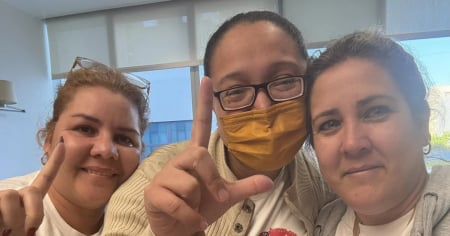"Cubans are disconnected across generations of emigration," began TikTok creator @May_dolys in response to a comment she received on one of her videos. The comment read: "The hypocrisy we're witnessing is also that those with papers feel superior. Immigrants are just the same, just luckier for having arrived earlier."
In her video, May_dolys (@tts_beauty_fashion) reflected on what she considers a lack of understanding among different generations of Cuban migrants. She explained that some of those who are emigrating now do not truly grasp what it means to migrate, as they assume the process is simpler than it actually is. "I don't know if it's because a family member here lied to them and said, 'come here, and after a year and a day, you'll go back to Cuba, it's super easy,' or if they saw others doing it and believed it was easy, but migrating in any country in the world is not easy," she stated.
He added that emigrating involves sacrifices and responsibilities, such as accepting that one does not know when they will be able to return to Cuba or embrace their family. With a reflective tone, he insisted, "If you are going to take the step, you have to be willing to take risks and assume all those responsibilities."
The video generated a variety of reactions. Some agreed with his stance: "It was always called the 'definitive exit' and people couldn't go back"; "You're absolutely right; many arrive thinking this is easy and then start complaining"; "In the 90s, leaving Cuba was a one-way road."
On the other hand, there were those who questioned his words: "Those now have worked hard to get here and have had a tougher time than we did. It's better to support them before criticizing"; "It's not a disconnection, each generation faces different challenges"; "The current Cuban doesn't emigrate, they seek political asylum because we are persecuted in our own land."
The comment that led to this much-discussed response was left by the user on a previous video by May_dolys, in which she shared her opinion on what she considers a problem of victimhood among Cubans. In that first clip, she stated: "The blame for the Cuban situation doesn't lie in any historical moment; it lies with communism, which is akin to the victimhood we are currently seeing among Cubans." She also criticized those who seek to blame other countries or presidents for the difficulties faced by Cubans. "It's easier to blame a historical moment, but the reason we Cubans are in our current situation is communism. And who brought communism here? We Cubans ourselves."
Although opinions on his words are divided, what is clear is that his reflections have touched on a sensitive issue for many, especially in the context of the challenges and expectations of the Cuban community abroad.
Frequently asked questions about Cuban emigration and the social situation in Cuba
Why do some Cubans think that emigrating is not as easy as it seems?
Emigrating is a complicated process filled with challenges. While it may seem easy from the outside, immigrants face significant sacrifices, such as adapting to a new language, finding employment, and the uncertainty of not knowing when they will be able to return to Cuba or see their family again. Additionally, misguided expectations of a simpler life abroad complicate the adaptation process.
What is the perception of Cubans about life in the United States?
Many Cubans on the island have the mistaken perception that life in the United States is easy and prosperous. This is due to the lack of comprehensive and realistic information about the challenges that emigrants face, such as the high cost of living and the need to work hard to get by. The idea that the United States is a land of abundance can distort the expectations of those considering emigration.
How does Cuban emigration affect families on the island?
Cuban emigration generates an emotional and economic burden for families that remain on the island. Emigrants often send money and resources to support their loved ones in Cuba, which creates expectations and, at times, tensions due to the constant demands and economic pressure on those who have emigrated. This situation can affect family relationships and lead to conflicts.
What challenges do newly arrived Cubans face in the United States?
Newly arrived Cubans face various challenges, such as adapting to the language, finding employment, and establishing themselves economically. In addition, they may encounter prejudices and expectations from those who are already in the country, which complicates their integration and initial stability. These challenges reflect the complexity of the migration process and the need for strong support to overcome difficulties.
Filed under:
